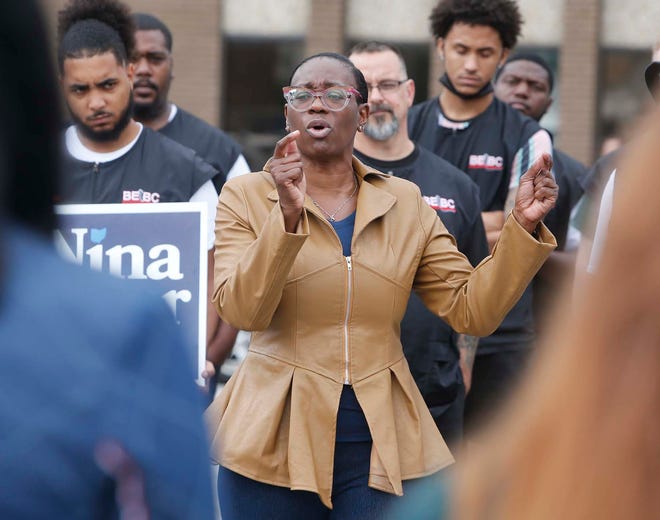
At first glance, the special election in Ohio's 11th Congressional District has all the ingredients for a referendum on the state of the Democratic Party.
Former Ohio Sen. Nina Turner built a national profile working on Bernie Sanders' 2016 and 2020 presidential campaigns and is backed by members of the "Squad" in Congress. Shontel Brown, chair of the Cuyahoga County Democratic Party, secured endorsements from Hillary Clinton, U.S. Rep. Joyce Beatty and the mother of former U.S. Rep. Marcia Fudge.
The progressive versus the establishment — a tale as old as time. In this case, though, there's more to the story.
While the race highlights fissures within the party heading into 2022, observers say there will be few lessons to learn from an off-year special election that's expected to generate low turnout.
As for the voters?
"I think we just want some attention paid and some progress paid in our community and our neck of the woods," said Cleveland City Council member Kevin Bishop, a Brown supporter.

Turner, Brown rally local support
Turner and Brown are among 13 Democrats who will appear on the Aug. 3 primary in the 11th District, most of which is centered around Cleveland but also includes Akron. However, the two women emerged months ago as clear frontrunners in the crowded race.
And both Cleveland natives have strong local ties anchoring their campaigns.
In addition to her work for Sanders, Turner's resume includes Cleveland City Council member and state senator for the 25th District. Brown began her career in public office on the Warrensville Heights City Council and now serves as a Cuyahoga County Council member.
Those roots have translated to a slew of endorsements from local leaders in northeast Ohio, including Cleveland Mayor Frank Jackson for Turner and Akron Mayor Dan Horrigan for Brown. Akron City Council President Margo Sommerville believes Brown is best equipped to help residents rebound from the pandemic and combat the inequities it exacerbated.
"It’s so important that we elect good Democrats like Shontel Brown who can sit at the table and bring people together around these important issues so that we can produce results," Sommerville said. "We don’t need anyone at the table that’s going to help further that divide."
N.J. Akbar sees it differently. The president of the Akron School Board said Turner is someone who will speak truth to power for her constituents and look out for Akron, instead of treating its residents like "stepchildren of the district."
"If we’ve learned nothing else from the pandemic and nothing else from the summer racial reckoning that this country found itself on the precipice of, we should learn that there’s an urgency of now, that we can no longer wait to deal with these pressing issues," he said.
Candidates lay out priorities
The winner of next month's primary is poised to secure the seat in the Nov. 2 general election. The district is heavily Democratic thanks to gerrymandering, and Fudge won reelection last year with 80% of the vote before leaving to serve as U.S. Housing and Urban Development secretary.
What's less clear is what kind of Democratic voters want to see in office.
Turner has been dubbed the progressive in the race due to her active support for policies like Medicare for All. In an interview, she challenged the idea that her desire to support union jobs and relieve people of student loan debt is too far to the left, noting that poverty isn't bound by a political party.
Turner also applauded progressive Democrats for pushing President Joe Biden to advance their priorities and said the child tax credit is an example of how lawmakers can use policy to help those who are struggling.
"We can do better than going back to normal, because some people’s normal was not OK," she said.

For Brown, progressive is a relative term. She touts her legislative experience during the pandemic, which included declaring racism as a public health crisis in Cuyahoga County, and said she wants to improve broadband disparities that were highlighted as people learned from home and sought telemedicine.
If elected, Brown said she would also prioritize jobs and health care and pledged to vote for Medicare for All if it comes before Congress. She believes bipartisanship is key to getting results and said Democrats can make incremental progress, then come back and assess what didn't get done.
"I don’t think the all or nothing approach is effective," Brown said. "We usually end up with nothing."
The progressive question
In recent days, Turner's campaign has beat back attack ads from the pro-Brown Democratic Majority for Israel that painted her as a candidate who will further divide people. According to recent Federal Election Commission filings, the group has spent over $400,000 on advertising to oppose Turner.
Despite this and other tensions in the race — including criticism of Turner's comments about Biden — the differences between the two candidates are minor on most policy issues, said Justin Buchler, a political science professor at Case Western Reserve University.
And because special elections are so unique, observers say the outcome in the 11th may not reveal much about the future of the Democratic Party. It could, however, test whether grassroots progressive energy can still deliver victories, said Our Revolution executive director Joseph Geevarghese.
That said, Geevarghese believes Turner isn't the typical progressive candidate.
"Her opponents try to cast her as a wild-eyed idealist, but I think if you look at her track record as a local elected, if you look at her national advocacy, it has been pragmatic," he said.
Local leaders, meanwhile, don't see the primary as a battle between different factions of Democrats. They know their residents are hurting in the aftermath of the pandemic and want a representative who's present and listens to their needs.
Who voters choose to carry that mantle remains to be seen.
"Does this person know me and what I deal with and my issues and will they fight for me?" Akbar said. "Is this a champion for me, or is this a champion for the status quo?"
Haley BeMiller is a reporter for the USA TODAY Network Ohio Bureau, which serves the Columbus Dispatch, Cincinnati Enquirer, Akron Beacon Journal and 18 other affiliated news organizations across Ohio.
Source link







